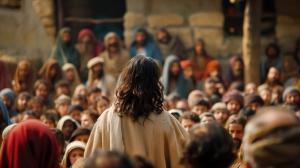
We live in a divided world. We are divided by race, gender, sexual preference, religion, or politics. There is only one way to bring unity in every situation: to follow the model Jesus gave us. Let’s take a look.
Jesus the Uniter
Jesus repeatedly spoke about unity. He did not focus on simply agreeing, but talked of unity regarding a divine relationship and spiritual purpose. Jesus links the unity of His disciples to the unity of the Trinity, preaching unity in love, purpose, and spirit:
- Unity as a witness to the world – John 17:21 “so that they may all be one, as you, Father, are in me and I in you, that they also may be in us, that the world may believe that you sent me.“
- Unity through love – John 13:34-35 “I give you a new commandment: love one another. As I have loved you, so you also should love one another. This is how all will know that you are my disciples, if you have love for one another.”
- Unity in spirit and purpose – Ephesians 4:3-6 “striving to preserve the unity of the spirit through the bond of peace: one body and one Spirit, as you were also called to the one hope of your call; one Lord, one faith, one baptism; one God and Father of all, who is over all and through all and in all.”
Our faith bridges divides through our “oneness” with Jesus.
Jesus the Divider?
Ironically, Jesus states in Luke 12:51 that:
“Do you think that I have come to establish peace on the earth? No, I tell you, but rather division.”
Jesus, the divider? Well, yes, in the sense that truth can be polarizing. This is one of the major problems in today’s society. Pilot asked Jesus, “What is truth?” It seems in today’s society that truth is subjective when, in reality, it’s not. Everyone has their version of the truth or “alternate facts.” We always had journalists to keep people honest in the past, but that is no longer the case. Truth triumphs, and combined with our unity in Jesus, we can overcome many obstacles and create a bridge to peace.
Unity in Today’s World
Societal norms can be very divisive, even amongst Catholics. I think the divide internally amongst Catholics is related to age and the acceptance of what society preaches as opposed to Jesus’ teachings. We see younger Catholic families supporting topics like abortion, IVF, assisted suicide, and gay marriage, to name just a few. These subjects are the opposite of what Jesus teaches us, so why is there such a difference?
Unfortunately, the younger generations do not always understand our faith well. This has resulted in a different commitment to the teachings of Jesus and the Church:
- Many people feel the Church is too rigid or out of touch with modern realities.
- Some parents do not model the faith for their children through prayer, a sacramental life, or spiritual mentorship.
- Many young Catholics lack spiritual formation or were poorly catechized.
- The obligation to attend Mass often conflicts with kids’ sports, or other “priorities” on Sundays. Major faith events like First Communion and Confirmation are treated as milestones in a child’s life instead of events that help grow their child’s faith and lived experience of the faith.
- Some families feel disconnected from their parish or unsupported during personal struggles.
- Social media and increased emphasis on science (Big Bang vs. evolution) are examples of teachings that turn people away from the Church.
There are many reasons for the divide, so how do we bridge these gaps to unite people with Jesus?
Bridging the Divide to Unity

The best way to grow unity is to model it for others, as Jesus modeled it for us. The Beatitudes are a good place to start. Society today rewards aggression and teaches people to speak over each other, and listen to respond instead of listening to hear. The Beatitudes promote:
- Blessed are the peacemakers—this is a call to active bridge-building. We cannot be passive in striving for peace. In ministry, we are taught to minister where the person is (in their journey), and we must do the same while building bridges.
- Blessed are the meek – respond to aggression with strength through gentleness. Society views meek people as weak, but there is strength in being gentle with one another.
- Blessed are the merciful—forgive all, even when it is not deserved. Forgiveness opens the door to engagement and resolution. It almost seems that forgiving others is a sign of weakness in society. It isn’t. True forgiveness requires emotional maturity, courage to let go of resentment, and wisdom to discern when reconciliation is appropriate.
Jesus says in John 13:34-35:
“I give you a new commandment: love one another. As I have loved you, so you also should love one another. This is how all will know that you are my disciples, if you have love for one another.”
Be the Model of Unity Jesus Is!
Being gentle, loving, and forgiving in a harsh environment and standing up for Jesus’ radical truth are models we as Catholics can use to find peace and promote unity in the world. Let’s not comply with society’s norms, but live Jesus’ model daily. We may not win over everyone, but we can help make the world more peaceful and help others find Jesus.
Please share your thoughts in the “Comments” section.
Peace
If you like this article, you might enjoy:
The Harvest: Embracing the Call for Laborers
Spiritual Priorities: Insights from the Gospel
IRS Decision Impacting Church Endorsements












